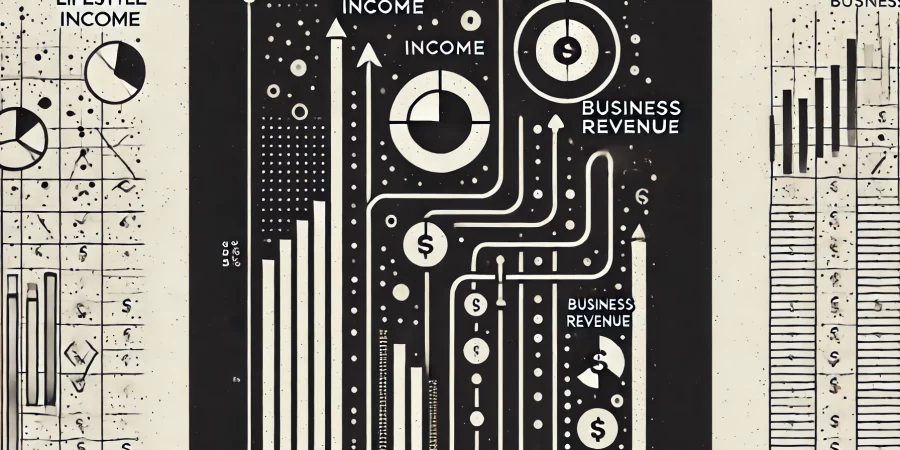Statistically speaking, we are being misinformed about finances.
The input we receive from the financial news, job postings, forums, and the groups we hang around, etc. often results in our mindset becoming muddled about what our true financial targets should be. And what we end up believing is way off. Public data is just common knowledge, lags behind facts, and will keep you stuck.
My point is, that if you are using median income, Glassdoor.com, or your basic living expense needs as a financial benchmark for your goals, then you are setting yourself up for long term disaster.
For example, let's start with:
- Basic Expenses,
- Earned Income (typically from a job or freelancing)
- and Net Disposable Income
Basic Expenses
Depending on where you live in the United States, I will assume that the average individual, and household, can easily spend between $4,000 - $7,000 per month on food, housing, transportation, insurance, clothes, entertainment, health care, donations, etc. Of course this varies depending on the size of your family and the geographic location that you live in.
With a quick Google search such as "average U.S. household expenses", you can probably verify some of these statistics for yourself. There is also a great site put up by MIT with a "Living Wage Calculator" that lists out cost of living by metro area.
Check that out here: https://livingwage.mit.edu/
Beyond just the basics, most of us have hidden costs that we don't always account for in this number when we do our budgets... Things like membership dues, continuing education, fees for our kids sports teams, that broken spoke on our mountain bike wheel, a season pass for the local ski resort, etc.
So, the first rule here is to not let "statistics" influence the beliefs that you hold about what your expenses should be. It's up to you to find some time to do some really deep introspect about what your real basic needs are.
And don't feel guilty about it! Something that took me a long time to get over was this thought that "maybe I just need to cut this expense out of my budget" or "if I only didn't have to pay for my internet and cell phone bill, then I may be able to save another $125 per month".
That mentality does nothing but make you feel crappy, and reject any possibilities that you are able to earn more to cover it.
The fact is, that it costs money to live. It's not 1953 or 1982. If you find that your basic needs add up to $10,000 per month, or even more... then that is what it costs. And that is NOT your financial goal!
I find it ridiculous when I read some article about how if you save even just $1.00 per day on your meals that it adds up to several hundred dollars per year in savings. It's not ridiculous because it's not true, it's ridiculous because it trains you to be a penny pinching curmudgeon that focuses on that $1.00 you may be losing, rather than what you can do to start winning the game.
Earned Income
If you live in the United States, the average household income probably falls somewhere between $50,000 and $90,000 per year for a household. Which lands us somewhere between $4000 and $7,500 per month in income.
This is only a statistic, and unfortunately many people are not even earning that amount. It does not take a mathematician to figure out that if you are earning $10 or $15 per hour, that you will need to be pushing 80 hour+ weeks on the clock to be earning between $3,200 and $4800 per month before taxes.
Time after time I've found that many employers and their job offers would consider $20/hr - $30/hr a "good" wage. Even at these rates, you will still be pushing a 40 hour week to gross that same income of $3200-$4800 per month.
Don't get me wrong, I'm not saying that there are not good well paying jobs out there, or that you can't make $300k or more a year as a designer... but what I am saying is that it seems like most offers are not looking out for you. This goes right back to Module I where I shared that you can't depend on your friends, family, the government, or your employers to solve your financial problems for you.
Net Disposable Income
So far, our future is not looking very bright with these numbers.
With some more 4th grade math, we can quickly discern that on the low end we'll basically be under water, and working our life away.
Even at the higher end of the average U.S. income ($90k/year) and lower expenses, it is not going to give us much to work with.
Sure, you may be grossing $7500 per month but will maybe only be taking home $5600-$6000 to cover the rest of your expenses.
Let's just say you are VERY disciplined and do not increase your lifestyle, never take a vacation, your vehicle never has any issues, and you never want to buy yourself a new snowboard, a mountain bike, or a pet... then you may be able to save an extra $18,000 to $24,000 a year.
That may seem like an awful lot of money for some folks, but in an upcoming lesson, I'll share why your working capital at retirement (savings) needs to be at least 25 times the amount of your annual lifestyle expenses. I don't know about you, but with that requirement... "saving up" alone does not make sense.
If your annual lifestyle is a meager $50,000 per year, you will need $1,250,000 at retirement. Thus, saving only $24,000 per year would take you 52 years to reach that goal.
I know, I know... but you probably won't just be saving... you'll be "investing" right?
That is true! Your goal is not to just "save" your way to wealth, it will be to invest.
But that is not what this course is about. This course is about gaining the awareness that we need to stop playing small, and start aiming for bigger targets.
So, let's begin to question ourselves for setting any income target that is less than $250k per year if we would like to play to win, because basic needs are not financial goals!
Essentially this is how I started to think of this...
- $60k a year is surviving. It will get my family by.
- $120k a year can get me into trouble.
- $250k a year is starting to look nice.
- $500k a year will increase my pace of investing - if I'm aggressive, disciplined, and live like I'm making $60k-$120k a year.
- $2.5 million a year will rapidly increase my wealth over 5-10 years, if I don't start to live like I'm a rock star or MC Hammer.
- Retiring with $2.5 million at work would be modest.
- Retiring with $25 million to $50 million (or more) at work is ideal.
Right now, those higher numbers may seem like a lot, but as we progress through the next lessons in this module you will see why it's important. We'll take a look at that 25x retirement number, paying down debts, short term needs, and even get loose with listing out our material desires.
Once you get it all captured and clear, these bigger numbers will start to make sense, and there is absolutely no reason why we should feel like it's beyond what we deserve.
The crossroads ultimately end up being:
- Keep working harder. Try to earn more per hour through raises or more certifications, etc. + increase our responsibility and the number of hours that we work, until we don't have any time left to live life.
- Or, learn what we truly need to produce financially, what we desire to earn and live the life we want to live, and then begin working on the vehicles that will get us to that destination... such as products, businesses, or investments.
Again, FAIR WARNING... this course is not about how to make money. I want you to become aware of how outdated advice and common public knowledge will only keep you thinking small. (Plus, society and that negative self-talk will not hesitate to snap us back into "reality" if we allow them to...)
We have a lot more lessons to cover... so, I'm trying to keep this message as simple as possible. Do you have any questions or comments about this lesson? Leave them below...









One Response